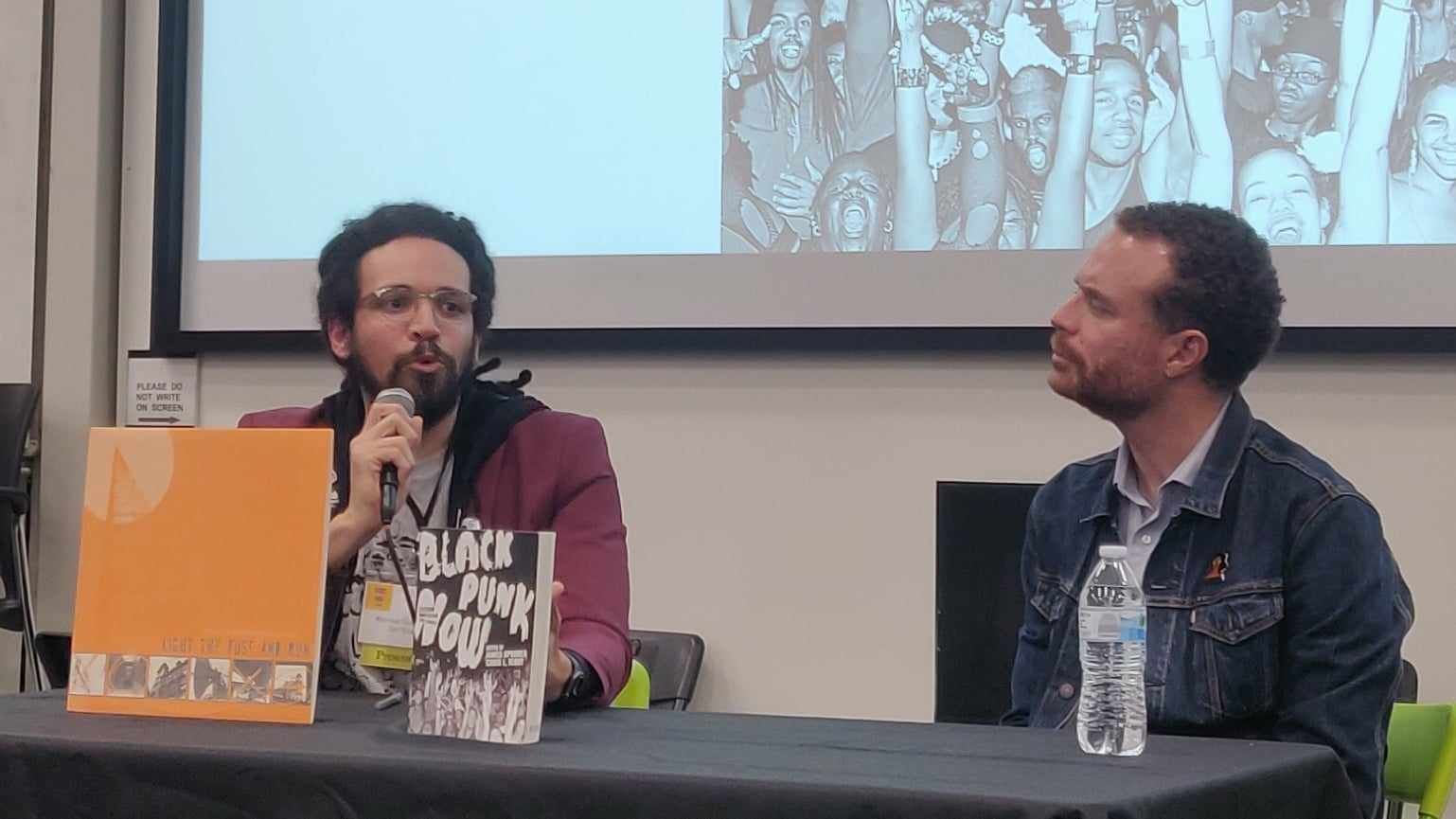Coloring Outside Your Guidelines
A. J. Urquidi asks, “Who’s punk? What’s the score?” to a bunch of rad nerds at Cal State Fullerton’s PunkCon 3.
By A. J. UrquidiMay 11, 2024

PUNKCON 3, California State University, Fullerton, May 4, 2024.
It’s been a landmark week for US universities dusting off their suppression manuals and calling for armed backup to disperse and incarcerate their student bodies, whose members were caught applying ethics imparted by their liberal arts education. As tear gas temporarily cleared from trigger-happy cops and pro-genocide pyromaniacs raining nocturnal hell on SoCal youth, Saturday morning saw one college preparing to invite its own controlled chaos into the halls of higher learning: Cal State Fullerton in northern Orange County, this year’s host for PunkCon.
Fullerton’s background as an incubator for infamous 20th-century punk and alternative bands—not to mention the town’s persistent skate-punk scene, with venues such as retailer Programme regularly bursting at the seams with eager-to-mosh kids—makes it an obvious candidate to hold an academic conference/performance showcase dedicated to, according to PunkCon’s programmers, “centering and celebrating the diversity of punk artists, musicians, academics, vendors, activists, and scholars.” These QTPOC/BIPOC organizers founded the conference at UC Riverside in 2019. (I inhaled the last pizza slice at the backyard off-campus aftershow that night. Sorry, hungry teenagers.) During pandemic lockdown in 2021, the conference’s architects facilitated a second, virtual gathering, and have ceaselessly worked to wrest historicization of the genre away from gatekeepers, educating younger punks about queer, non-white-male pioneers like Alice Bag. Their ambitious goals clash with the white-supremacist history of Fullerton’s neighbor Anaheim, a “Klavern” fostering KKK activity exactly 100 years ago—Klansmen seized power through 1924’s local elections, in case you’re not yet worried about November’s ballot parallels.
Besides its musical challenges to authority, Fullerton is a logical choice to host because conference co-founder Marlén Ríos-Hernández now teaches in CSUF’s Chicana and Chicano Studies Department. (Another co-founder, UNLV lecturer Susana Sepulveda, ran PunkCon 3 alongside her.) Two floors below Ríos-Hernández’s office, a day of panels kicked off with opening remarks from guitarist-memoirist Kid Congo Powers and his coterie of outcasts; marketplace thrift vendors lined the quad, as patrons were graced with outdoor performances from artists including Chicano rockers Flesh for Fantasy and drag harlequin Homo Clown. It wouldn’t truly be punk without an immediate visit from police to investigate all the commotion during setup. Maybe they just love the smell of ACAB in the morning?
Following lunch, Ríos-Hernández interviewed Tequila TV host Tequila Mockingbird, a spirited contrarian who founded the L.A. Punk Museum with seed funding from her pal Lemmy (of Motörhead fame). She decried the mid-1980s turn in L.A., when all hell broke loose and numbskull bros inundated the underground to ruin the vibes. Mockingbird shared tales of fallout between herself, zine-makers, and “crackhead” gallerists, and described an aversion to identity labels in punk’s early days: these fans didn’t call themselves gay, straight, or bi; they were too busy not having sex. When they finally did, it was with whomever felt right—they didn’t think too hard about it. In the end, she admitted to being an “Annunaki princess who only came to earth to have a good time,” a statement that explains a lot.
Afterward, musician-author-student Marcus Clayton and musician-author-teacher Chris L. Terry commandeered the room to discuss their respective roles in assembling an essential anthology, Black Punk Now (2023). It gathers multigenre narratives from Black and mixed-race punks like them who analyze the scene in the time since co-editor James Spooner’s groundbreaking documentary Afro-Punk was released in 2003. Clayton read from his autofictional essay, which captures the racial ignorance he faced at a nightmarish show at Anaheim’s Doll Hut; meanwhile, Terry recounted stories of adolescence: buying Bad Brains EPs, skating around, admiring his dad’s collection of rock records made by Black artists. Their playful chemistry and nerding-out about the Soul Glo show gave the impression of watching a live podcast from a handful of longtime friends. It felt like community.
If today’s kids, facing racist surveillance states, climate terror, and late-stage capitalism, can hold onto that feeling, embrace each other’s strengths, embrace punk—they might just be able to survive.
¤
Photo by of Marcus Clayton and Chris L. Terry by contributor.
LARB Short Takes live event reviews are published in partnership with the nonprofit Online Journalism Project and the Independent Review Crew.
LARB Contributor
A. J. Urquidi is the copydesk chief of Los Angeles Review of Books and co–executive editor of indicia.
Did you know LARB is a reader-supported nonprofit?
LARB publishes daily without a paywall as part of our mission to make rigorous, incisive, and engaging writing on every aspect of literature, culture, and the arts freely accessible to the public. Help us continue this work with your tax-deductible donation today!